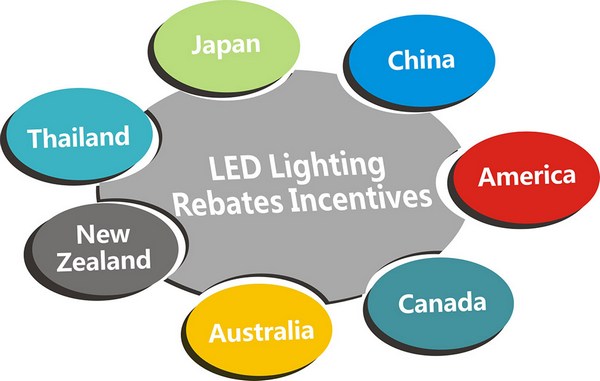With the rapid development of global economy, energy and environment has become one hot topic discussed by us. So far, energy and environment problem has been one of the important factors that retrained economic development. Under such circumstances, many countries have launched key lighting projects and in addition carried out RELEVANT incentives and rebates program. As the 4th generation light source, LED is characterized by energy-efficiency and eco-greenness. LED incentives and rebates programs have risen around the world. Here bellow is the introduction to LED incentives and rebates in some major countries.
 |
|
LED lighting rebates in different countries. (Photo Courtesy of Syhdee) |
China
Early in 2012, General Office of NDRC, Ministry of Finance and Ministry of Science have jointly issued Notice of Annual Financial Subsidies to Promote the Work of the Semiconductor Lighting Products. Hereafter, many local governments rolled out relevant local subsidies policies for LED lighting industry. For such a long time, these subsidies policies undoubtedly stimulated vast investment on LED lighting career.
To achieve the objectives of semiconductor lighting in the 12th five-year plan, national government has proposed 2 subsidy policies:
NO. 1: Subsidies for Promotion Project of Semiconductor Lighting Products in 2012
This subsidy policy is conducted by means of bidding. LED lighting companies that won in bidding program are entitled to subsidies.
NO. 2: Subsidy Policy on Energy Saving Products
The State Council has compiled one subsidy budget of 36.3billion for 4 categories of energy saving products: Energy-efficient appliances, fuel-efficient cars, high efficiency motors and energy-saving lamps&LED Lamps.
At the early of 2013, Ministry of Finance has announced government purchasing list of energy saving products, in which LED street light, tunnel light, LED down light and reflective self-ballast LED lamp were listed.
As LED lighting market soared increasingly in China. All parts of the country have put forwards LED incentives and rebates policies to speed up the whole process. In many developed cities, such as Shenzhen, Guangzhou, Beijing, Hangzhou, LED lighting career has bubbled desperately.
U.S. and Canada
LED Incentives and Rebates Program has been advocated successfully in U.S. and Canada. In the American and Canadian market, LED lamps approved by Energy Star are able to listed on rebates. For LED lighting companies, it is one profitable deal.
So far, LED lamps that can apply for Energy Star are limited to LED-based products that are alternatives to traditional incandescent bulbs as LED bulb light, LED Par light, LED Spot light and self-ballast LED luminaires.
Besides above all, Indoor luminaires are able to claim LED incentives and rebates by means of applying for DLC qualification. DLC qualified LED tube t8(2ft/4ft), LED panel light, LED mining lamp,etc. are much popular in American and Canadian market.
Australia and New Zealand
In Australia, relevant policies for LED luminaires have been advocated likewise. The most attractive one is in New South Wales(NSW), Australia. LED lighting companies can apply for SAA certification from FAIRTRADING in NSW and as the same time submitted AS/NZSCISPR15 test report.
Additionally, New Zealand IES has proposed Rebates and Incentives plan for LED recessed lamps based on CA135/CA80/IC/IC-F certification. Higher is the grade, more subsidies you can obtain.
Japan
In Japan, Japanese government has published encouragement policies for enterprises and civil. Through tax reduction and law-regulation, Japanese government enforced some large-scale-energy-consumption enterprises adopt energy saving products. Lots of local governments as well provided subsidies programs for LED lighting projects. The same as American and Canadian LED incentives and rebates projects, LED lighting subsidies policies varies in different counties and cities. All-in-one LED lighting subsidy policy is prevailing.
Thailand
LED lighting industry emerged in Thailand because of government advocating LED lighting projects. However, certification is a must if light source products exported to this country. Moreover, for Thailand business dealers, they are able to claim zero-tariff for their LED products if these products are certified by China Origin.( CO: A Certificate of Chinese Origin signed by China Council for the Promotion of International Trade.)
(Editorial Note: Article submitted to LEDinside by Syhdee.)





 CN
TW
EN
CN
TW
EN






